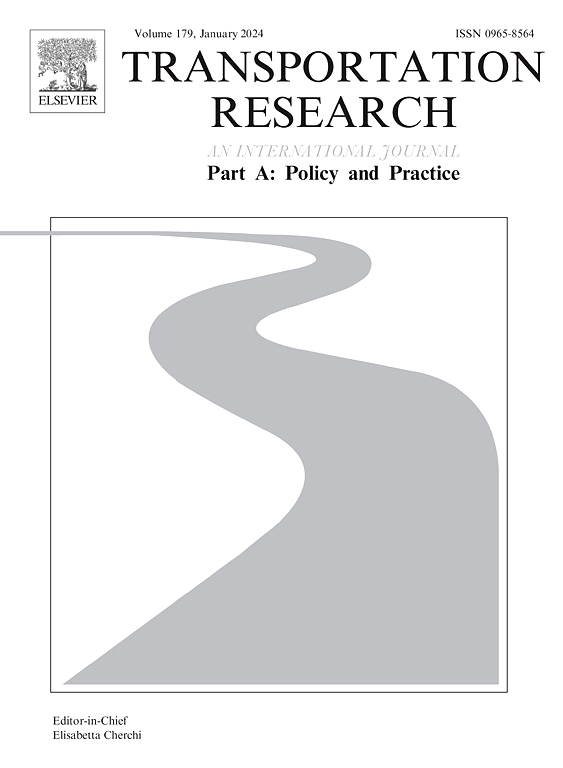纯电动汽车拥有量对交通需求及模式替代的影响
IF 6.8
1区 工程技术
Q1 ECONOMICS
Transportation Research Part A-Policy and Practice
Pub Date : 2025-07-26
DOI:10.1016/j.tra.2025.104614
引用次数: 0
摘要
运输脱碳是减少全球温室气体排放举措的关键部分。其中一个重要组成部分是将私家车的使用从内燃机汽车(icev)转向电池电动汽车(bev)。这导致了一系列激励措施的引入,这些措施影响了汽车类型的相对可取性,但也有可能通过它们对一般车辆使用的影响来影响更广泛的交通决策。我们在挪威的背景下研究了这一点,挪威通过一系列激励措施(最明显的是购置税减免)追求纯电动汽车的所有权,并且纯电动汽车的所有权急剧增加。根据2016年至2019年收集的非常详细的个人旅行调查数据,我们估计了纯电动汽车所有权对交通需求模式的影响。我们使用可观察方法的选择来减少选择偏差。我们证明,纯电动汽车的拥有量导致汽车出行需求的总体增长约为10-20%。这反映了从电动汽车到纯电动汽车的使用转变,但也反映了从公共交通、骑自行车和步行的巨大转变。这些影响还会因激励纯电动汽车使用的额外政策(如收费公路豁免)而增加。综上所述,尽管纯电动汽车的使用减少了基于排放的外部性,但它可能会加剧其他外部性,如拥堵外部性。我们的研究结果表明,在使用使纯电动汽车更便宜的交通激励措施时,需要谨慎,但除此之外,私人机动车辆的使用通常更便宜。本文章由计算机程序翻译,如有差异,请以英文原文为准。
The effect of battery-electric vehicle ownership on transport demand and substitution between modes
Transport decarbonization is a key part of moves to reduce global greenhouse gas emissions. A major component of this involves shifting private car use from internal combustion internal engine vehicles (ICEVs) to battery-electric engine vehicles (BEVs). This has led to the introduction of a range of incentives that influence the relative desirability of car types, but also have the potential to influence wider transportation decisions through their effects on vehicle use in general. We examine this in the context of Norway which has pursued BEV ownership through a range of incentives, most notably purchase tax exemptions, and has experienced dramatic increases in BEV ownership. Based on highly detailed individual level travel survey data collected between 2016 and 2019 we estimate the effect of BEV ownership on transport demand patterns. We do so using a selection on observables approaches that seeks to reduce selection bias. We demonstrate that BEV ownership leads to an overall increase in car trip demand in the order of 10–20%. This reflects shifts from ICEV to BEV use, but also sizeable shifts away from public transport use, cycling and walking. These effects are increased by additional policies that incentivize BEV usage such as toll road exemptions. Together this suggests that while BEV usage reduces emission-based externalities, it may exacerbate others such as congestion externalities. Our results suggest a need for caution when using transportation incentives that make BEVs cheaper, but additionally make private motor vehicle use in general less expensive.
求助全文
通过发布文献求助,成功后即可免费获取论文全文。
去求助
来源期刊
CiteScore
13.20
自引率
7.80%
发文量
257
审稿时长
9.8 months
期刊介绍:
Transportation Research: Part A contains papers of general interest in all passenger and freight transportation modes: policy analysis, formulation and evaluation; planning; interaction with the political, socioeconomic and physical environment; design, management and evaluation of transportation systems. Topics are approached from any discipline or perspective: economics, engineering, sociology, psychology, etc. Case studies, survey and expository papers are included, as are articles which contribute to unification of the field, or to an understanding of the comparative aspects of different systems. Papers which assess the scope for technological innovation within a social or political framework are also published. The journal is international, and places equal emphasis on the problems of industrialized and non-industrialized regions.
Part A''s aims and scope are complementary to Transportation Research Part B: Methodological, Part C: Emerging Technologies and Part D: Transport and Environment. Part E: Logistics and Transportation Review. Part F: Traffic Psychology and Behaviour. The complete set forms the most cohesive and comprehensive reference of current research in transportation science.

 求助内容:
求助内容: 应助结果提醒方式:
应助结果提醒方式:


